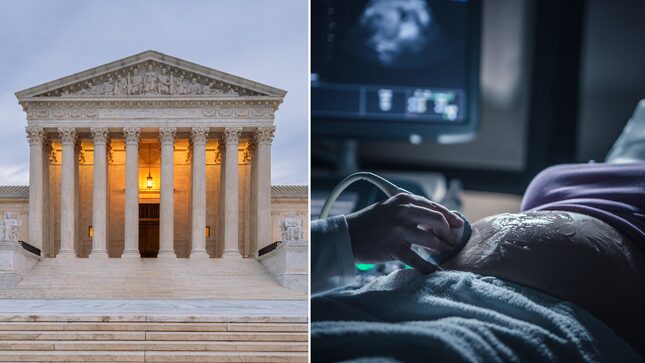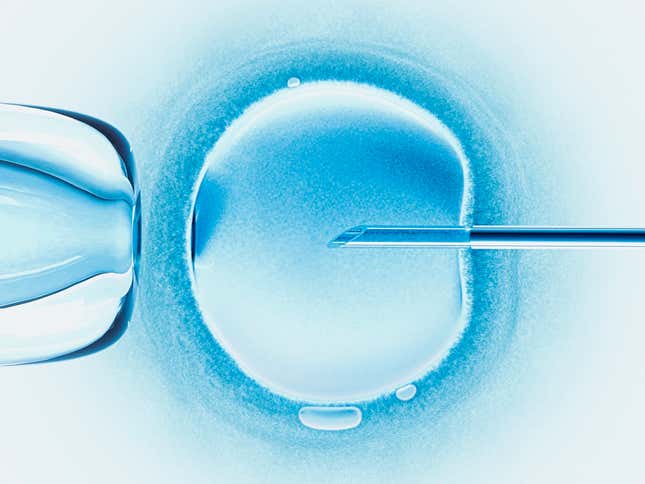50 Years After Roe v. Wade, ‘Fetal Personhood’ Laws Are Dangerously Looming
One of the anti-abortion movement's most twisted, dehumanizing ideas is that an embryo should have the same rights as a born person—and it's gaining momentum.
In Depth

In 2009, Jessica Tebow and her husband were eagerly awaiting the birth of their first child, when an unexpected miscarriage and the threat of a possibly fatal infection—which could also cause infertility—forced her to have an emergency abortion. Tebow, who detailed the experience in a San Francisco Chronicle op-ed in September, said she and her husband saved the miscarried embryo as they wanted to have a small, private ceremony to mourn. But when her husband called the nearest funeral home and asked if they could pay for some sort of cremation process, they were told they needed a death certificate, to check with the local fire department, and to contact a coroner.
Upon doing so, the two were promptly investigated by the Glendale, California, police department, and Tebow, still reeling from the trauma of losing a wanted pregnancy, was questioned by police about “the baby I had put in the freezer.” Tebow realized police had broken into and searched her home. They had restrained her husband, threatened to arrest him, and confiscated their frozen, miscarried embryo.
Ultimately, the couple faced no criminal charges or arrest; a coroner confirmed that what police had alleged was a dead baby was actually an embryo, and they were allowed to cremate the remains. Still, after the brush with law enforcement, Tebow lost her job. The shame and stigma surrounding their experience prompted the couple to move away.
Tebow and her husband’s story is the result of the nauseating concept known as fetal personhood—the anti-abortion movement’s endgame, which confers legal citizenship upon fetuses and embryos, inevitably at the cost of pregnant people’s rights. Sunday would have marked 50 years since Roe v. Wade, had it not been overturned last June. But throughout that half-century, the constitutional right to choose was undermined by the anti-abortion movement’s freakish devotion to codifying fetuses and embryos as fully formed human beings—which it has achieved, to varying degrees of success, in tandem with state and local lawmakers, health care systems, or, in Tebow’s experience, law enforcement.
Now, without Roe, anti-abortion movement leaders have made it clear their next goal is enshrining fetal personhood. Lauren Wranosky, a research associate at Pregnancy Justice, an organization that offers legal services to pregnant people facing criminalization, told Jezebel of the myriad fetal personhood cases she’s reviewed in her work: An aspiring political candidate sued to list the date of their conception instead of their birthday to qualify for an age minimum. Similarly, in a child sexual abuse case, the perpetrator asked that their victim’s age be calculated based on the date of conception to try to evade the highest maximum sentence, which can be imposed if a victim is under 14. In Mississippi—and other states—you can be denied a divorce while pregnant. Post-Roe, adults and children have been denied life-saving medications that can induce abortions or impact fertility. “What all of these achieve,” Warnosky said, “is separating the fetus from the pregnant person,” thus prioritizing the life of this potential human over the actual human carrying it.
When an embryo is considered a “baby,” this “[normalizes] the idea that a pregnant person is not their own person anymore, that they’re subservient to the rights, individuality, and full personhood of a fetus,” Dana Sussman, acting executive director of Pregnancy Justice, told Jezebel last year. This can lead to catastrophic outcomes for pregnant people: “If their rights are secondary to the fetus, or at odds with the fetus, that lends to an environment in which violence—whether it’s state violence like imprisonment, or interpersonal violence—can be committed against pregnant people with far less accountability.”
Fetal personhood is everywhere, not just in legislation
Farah Diaz-Tello, senior counsel and legal director of the reproductive justice legal advocacy organization If/When/How, told Jezebel that post-Roe, we’re likely to see even more cases of criminal investigations and charges for pregnancy loss. Without Roe, pregnancy and pregnancy outcomes will be investigated with more scrutiny than ever, especially as some state abortion bans explicitly establish fetal personhood by stating that life begins at conception.
Further, about 40 states have fetal homicide laws that have been misused by police to criminalize pregnant people for self-managed abortions or pregnancy loss in recent decades. Ironically, these laws were originally introduced to protect pregnant people by discouraging high rates of homicide targeting them. Yet, criminal charges for pregnancy loss and self-managed abortion tripled between the periods of 1973 to 2005 and 2006 to 2020, from 413 to 1,331 cases.
As more and more people rely on online searches and digital communications to seek abortion care, digital surveillance has led to more pregnant people being criminally implicated: In 2018, Latice Fisher, a Black mother in Mississippi, was jailed for experiencing a stillbirth shortly after searching online for abortion pills. The following year, Marshae Jones, a Black woman in Alabama, was jailed and charged with homicide for miscarrying after she was shot in the stomach. All of these criminalized outcomes are the result of the women’s fetuses being treated as separate human beings who were harmed by their would-be mothers.
-

-

-

-

-

-

-

-

-

-

-

-

-

-

-

-

-

-

-

-

-

-

-

-

-

-

-

-

-

-

-

-

-

-

-

-

-

-

-

-










































